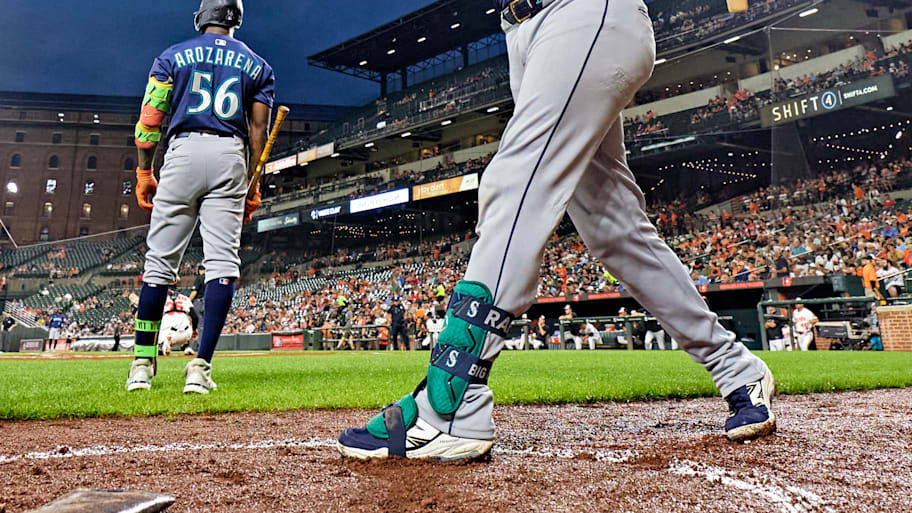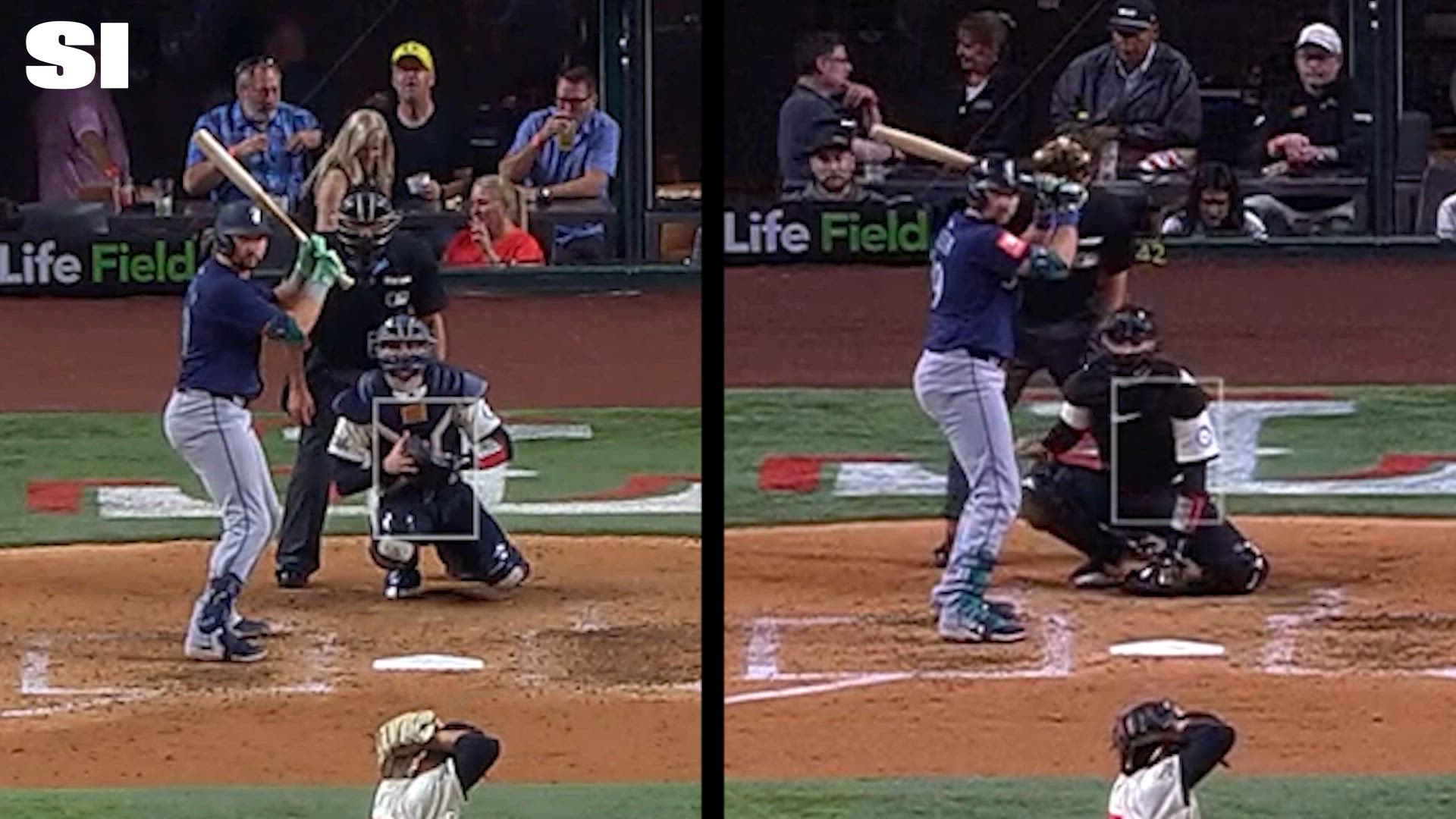
Editor's note: This story appears in the September issue of Sports Illustrated.
After every Mariners win, the 26 victors gather for a brief ceremony. Baseball is a team sport, but everyone involved understands that on any given night, one person was probably more valuable than everyone else, and only one person can receive the footlong pair of gilded testicles, hanging from a chain, emblazoned with a trident, that accompany the poetic title Nuts of the Game.
This season, the most valuable player has usually been catcher Cal Raleigh, who entered the stretch run with the major league lead in dingers in the scorebooks, the Home Run Derby trophy on his mantle and history in sight: With his 42nd long ball, he surpassed Todd Hundley of the 1996 Mets for the single-season record by a switch-hitting catcher. Up next was the Royals’ Salvador Pérez’s 2021 mark of 48 by a catcher, which he eclipsed on Aug. 24. With six weeks remaining, Raleigh still held an outside chance at the American League single-season home run record, which the Yankees’ Aaron Judge established at 62 three years ago. Raleigh sat a tenth of a point ahead of Judge for the AL lead in win probability added, a measure of how clutch he’s been. (Editor’s note: Judge has since overtaken Raleigh in WPA.) Raleigh is a perfect fit for Sports Illustrated’s Power List issue. And he did it all while shepherding a pitching staff beset by injuries to a 3.95 ERA, seventh in the AL. Seemingly every night he does something that makes his teammates gape—something Nuts-worthy.
“We should call it the Cal Award, probably,” says righty Logan Evans.
But unfortunately it’s Raleigh, 28, who gives out the Nuts, which means he’s almost never the one receiving them. If he hits a game-winning home run, he honors the reliever who kept it close.
Doesn’t it seem kind of ludicrous to create a player of the game award and all but exclude the guy who’s usually the player of the game? “It’s not about that,” Raleigh says. “It’s more about bringing everybody together at the end of the day and trying to enjoy a win for a few minutes, because it’s so hard in the big leagues to win. You gotta be able to enjoy it. And there’s always people that contribute, whether it’s one pitch or one swing. Maybe it was doing something little that goes unrecognized. So for me it’s not always about rewarding the guy who hits a home run or two home runs—it’s more about rewarding a guy who does their job well.”
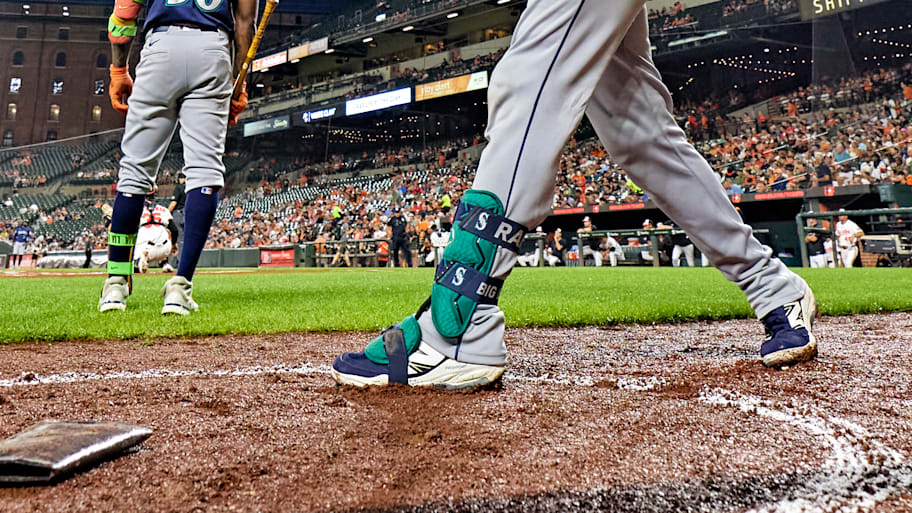
Raleigh has been doing his job well since 2022, the year he hit a towering walk-off shot to put an explosive end to what was then the longest playoff drought in North American sports. He’s been famous since July, when he became the toast of All-Star week, with his prodigious power and remarkable rear end, which led to the best nickname in baseball: the Big Dumper. Raleigh spent his whole life preparing to be good at baseball without giving much thought to what might accompany that success. In a lot of ways, his reality changed nearly overnight. But his attitude has not.
Says president of baseball operations Jerry Dipoto, “I’ve never worried less about someone being able to handle it.”
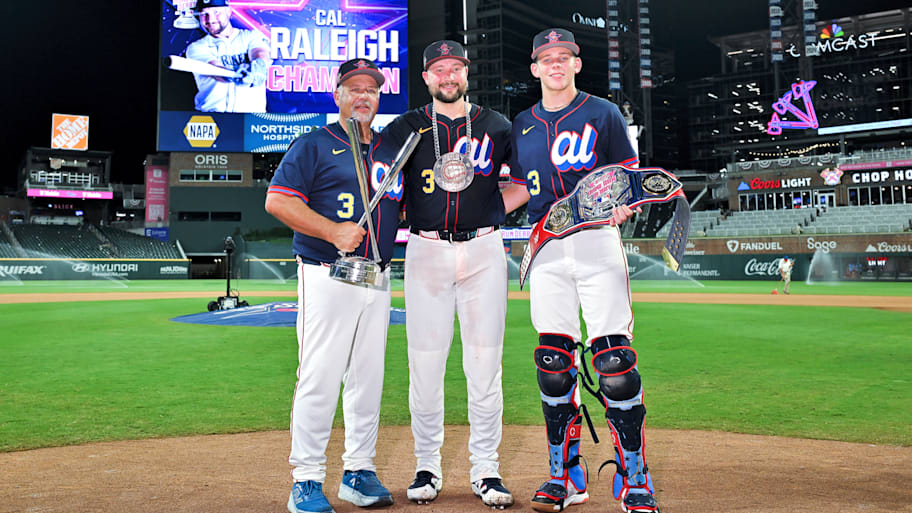
Raleigh hates the premise of this story. First, he disputes the idea that he’s famous. “I wouldn’t say that,” he scoffs. So he became the first catcher to win the Home Run Derby, with his dad, Todd, pitching to him and his 15-year-old brother, Todd Jr., catching, while nearly six million people watched from home. So he’s been in a T-Mobile commercial, signed endorsement deals with Nintendo, a local hospital chain and—best of all—a portable toilet brand, Honey Bucket. Todd Sr. and Cal’s mom, Stephanie, lined up for a bus during All-Star week only to realize that it was wrapped in their son’s face.
“I’m just a pretty average guy,” Cal insists.
But what’s worse is that people keep trying to tell him he’s not. Longtime friend Bret Baldwin, who grew up with him in Cullowhee, N.C., and is now an engineer nearby, tries to imagine how the interview went. “ ‘Please don’t ask me another question about why I’m so good,’ ” he guesses correctly. Make no mistake, Raleigh is polite for the entire 12 minutes, plus another five a couple of days later, but he visibly winces at the attention. “Nice to see you again,” he lies, before appearing to weigh the merits of turning and walking away.
Naturally, his teammates find this behavior hilarious. Every day or two, righthander Logan Gilbert shakes his head at his friend. “Fame,” he pronounces gravely, “has changed you.” (He is not the only one who has assigned himself the task of keeping Raleigh in check: “Everybody’s been cheering for him a bunch recently, so I’ve been trying to boo him a little bit to keep him down,” says righty Bryce Miller.)
“It’s funny, because he’s the last guy to actually change,” says Gilbert with a laugh. “He really does handle it very well—but I’m trying to convince him otherwise.”
The people close to Raleigh often find themselves in the unusual position of having to remind him that he’s a superstar. “He’s the prince of Cullowhee,” says Baldwin. The neighboring town of Sylva, home of Smoky Mountain High, which Raleigh attended, recently declared July 14, 2025, to be Cal Raleigh Day. Raleigh is such a major celebrity there that he’s made Baldwin a minor celebrity; people regularly recognize him and ask for details on Cal’s life.
Meanwhile, Raleigh says it has never occurred to him to use his name to get a coveted dinner reservation. (He’s cautious even when he eats at fast-casual restaurants that charge extra for various toppings. “Sometimes if I want guac, I’ll get it,” allows Raleigh.) Earlier this year, when he and three teammates were headed to dinner, he ordered them an UberX, the company’s cheapest option. Raleigh signed a six-year, $105 million extension before the season, backup catcher Mitch Garver points out. “Order an Uber Black,” he says. Raleigh only recently upgraded from the Toyota 4Runner he bought used to a new Toyota Tacoma.
“I’ve always been more of a cheap guy,” he acknowledges. “I like coupons.”
Dipoto suspects that it’s this attitude—plus a few dozen clutch home runs—that has so endeared him to Seattle. Raleigh looks and acts more like the clubhouse attendant putting baseballs in buckets than the slugger putting baseballs in the stands.
His dad says, “Twelve months ago, on this calendar day—he’s the same guy.” He’s not quite the same player, though.
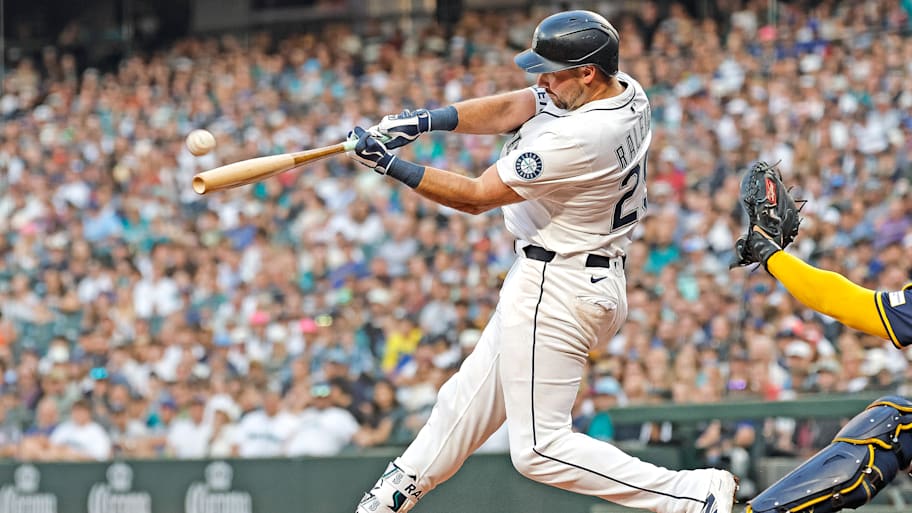
He could always catch. The son of a baseball coach who spent eight years at Western Carolina and then four at Tennessee, young Cal grew up studying the game. “I love the nuances,” he says. By middle school, he was calling his own games. “You didn’t shake,” recalls Baldwin.
Cal was the captain of every team he ever played on. He was a Division I-caliber basketball player, his father recalls, but he drove his coaches crazy by passing up clean shots. “He’d go rebound it and kick it back out and want his buddy to experience some of that,” Todd recalls.
Cal came by that naturally. When Todd coached his son in travel ball, he always sat him for the first game of a tournament. “I just never wanted that to be a thing,” Todd says. “He probably had less at-bats than anybody else on that team. We’d get in deeper into the tournament and I remember parents finally complaining, ‘Hey, you’ve got to play him. This is ridiculous.’ But I think he always liked it, too. He didn’t want it to be, like, Oh, I’m getting more at-bats because of who my dad is.”
On the drive back from games, they rarely discussed strikeouts and home runs. All Todd wanted to talk about—and eventually, all Cal wanted to talk about—was whether the team had won. “In high school, if he didn’t have a great game and they won, he was fine,” Todd says. “He’d be the first guy jumping up and down happy. So it’s not an act.”
Dipoto got his first glimpse of that attitude in 2019, when he visited the High A Modesto Nuts on a day Gilbert was pitching and Raleigh was off. The GM noticed the catcher of the future crouched on an overturned bucket of baseballs, taking notes on Gilbert’s outing the way other pitchers are often assigned to do.
After the game Dipoto brought it up with the coaching staff. “Why do you have Cal charting?” he asked.
The pitching coach laughed. “We don’t have him doing that,” he said.
When Dipoto asked Raleigh about it, the catcher explained he was just trying to learn more about how the pitcher saw himself so that he could refine his game-calling. By the next year, the Mariners were assigning all their young catchers to chart their young pitchers.
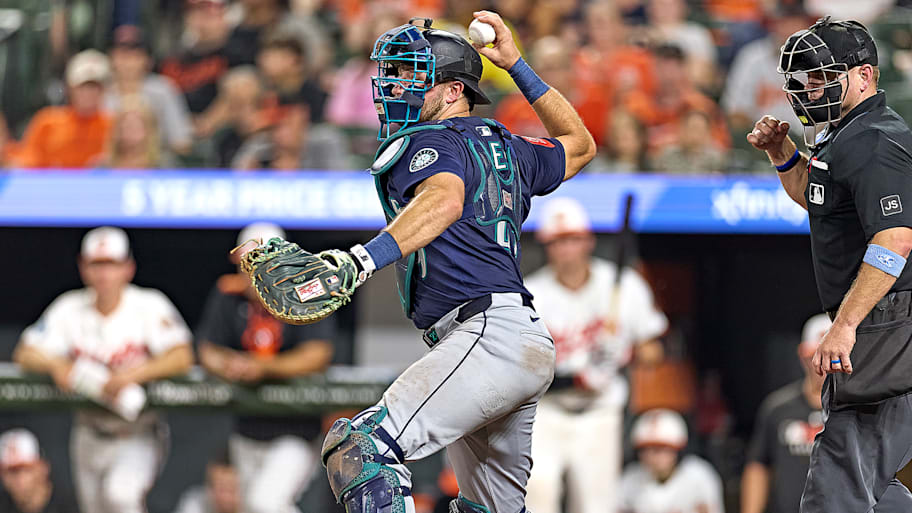
Those relationships pay off every day. Since the start of 2018, the year Raleigh was drafted out of Florida State, Dipoto has made 121 trades, according to a tracker maintained by Yahoo Sports’ Jordan Shusterman, but of Seattle’s top six starters, five were drafted and developed by the team. They are Raleigh’s best friends; several of them have been his roommates.
“He doesn’t let them make excuses,” says Mariners pitching coach Pete Woodworth. “He doesn’t let them stray. He keeps them accountable. As soon as they start veering off track, he slaps them in the face and gets them back.” Many pitchers, he adds, “want to make it more complicated than it is. [Cal says], ‘This is who you are. This is what you’re good at. Let’s just do that better.’ ”
That strategy fires his pitchers up. He does not play the cat-and-mouse game, always trying to fool the hitter. He calls for the pitcher’s strength, again and again. “If something’s working, he’s not going to go away from it until they prove they can hit it,” says Miller.
And Raleigh extends that same level of focus to every pitcher, “even the ones who only throw one inning,” says Woodworth. “He sits down with them and lets them air out the s--- that goes on inside their crazy little brains, and then gets them back to what’s simple and what’s successful.”
It has not always been so easy for him to do the same at the plate. He struggled early, facing a different sort of power issue: He managed just a .532 OPS in 47 games in 2021 (after slugging .608 in Triple A). He looked even worse to start ’22. When the team sent him back down, his career batting average was .166 and his slugging percentage was .294. Cal had been cut from teams as a child, and his father always brushed off his complaints: “Just get better.” He delivered the same message now. Around the same time, Mariners catcher Tom Murphy dislocated his left shoulder, forcing the team to call Raleigh back up, ready or not.
In his sixth game back, he socked a go-ahead home run. “I think it really gave him confidence to just say, you know, ‘I gotta go,’ ” says Dipoto. “ ‘I’m not worried about what anybody else is thinking.’ ” Raleigh had an .807 OPS the rest of the way and delivered that cathartic, playoff-ushering bomb against the Athletics, the 26th of 27 he’d hit on the season.
But nothing foretold this year. It took an assist from the greatest Mariners hitter ever to unlock this one. When Raleigh struggles at the plate, he tends to get too far forward. Instead of waiting for the ball, he lunges at it. He’s late on fastballs and early on off-speed pitches. As this season began, Seattle director of hitting strategy—and Hall of Fame DH—Edgar Martínez set Raleigh up with a chest-high tee that he placed near the catcher’s front foot along with a short bat. The idea was to force him to stay upright. “What it did was amazing,” says hitting coach Kevin Seitzer. “Oh my gosh.”
What it did was create one of the most lethal hitters in the sport. Left-handed and right-handed, Raleigh stays back in the box and crowds the plate. He pulls the ball in the air nearly 40% of the time, more than any other hitter, and he barrels up some 20% of the balls he hits, which ranks in MLB’s top 10. He will probably never compete for the batting title; nearly every swing is engineered to produce a dinger. And a lot of them do.
But when Raleigh and his father discussed his goals for the season, they didn’t spend much time on home runs hit or even on shutouts caught. Cal decided he wanted to take on more of a leadership role.
He doesn’t talk much, but when he talks, it’s an impact. He breathes life into people with just his presence.Mariners hitting coach Kevin Seitzer
A few days before he signed his extension, Raleigh stopped by Dipoto’s office at the Peoria, Ariz., facility, dressed in full uniform, and took a seat. For two and a half hours, he ran through an exhaustive audit of the organization. This was the player who spent the moments after the Mariners were eliminated from playoff contention on the final day of the 2023 season criticizing the team’s lack of spending. “Sometimes, you have to go out and you have to buy,” he said then.
He’d already become someone Dipoto checked with before he acquired a player, because Raleigh keeps detailed reports on most everyone in the league. So it was no surprise that he knew all the prospects’ names and the status of all his teammates’ contracts. He wanted to know whether the team he was committing to was committed to winning. Dipoto explained that Seattle had never been much of a destination for free agents but that he intended to keep improving the big-league roster via trades.
Four months later, when Dipoto sent two pitching prospects to the Diamondbacks for first baseman Josh Naylor, he got a text from Raleigh: “A++.”
As much as Raleigh prefers to lead by example, he’s starting to understand the power of his voice. “He doesn’t talk much, but when he talks, it’s an impact,” says Seitzer. “He breathes life into people with just his presence.” So Raleigh has started speaking up more in hitters’ meetings and in the dugout during games, even if it’s just to offer enthusiasm. And he encourages his teammates to celebrate the victories with the postgame ceremony he dreamed up.
The city, meanwhile, has fallen in love with him and with his club. The Mariners staged a campaign to get Raleigh to the All-Star Game, donning Be a Peach, Vote Cal shirts—complete with emoji—and using a butt-themed walk-up song playlist. Raleigh finished with the second most votes in the league after Judge and became Seattle’s first elected starter since designated hitter Nelson Cruz in 2015. Local restaurants have debuted meals named after him. Fans regularly tell Raleigh they’ve named their children after him. Sometimes it all feels like a lot. But he understands what fans understand: He is leading a team that could make Seattle go nuts.
More MLB on Sports Illustrated
This article was originally published on www.si.com as Cal Raleigh Is Carrying the Mariners With Glute Force.
